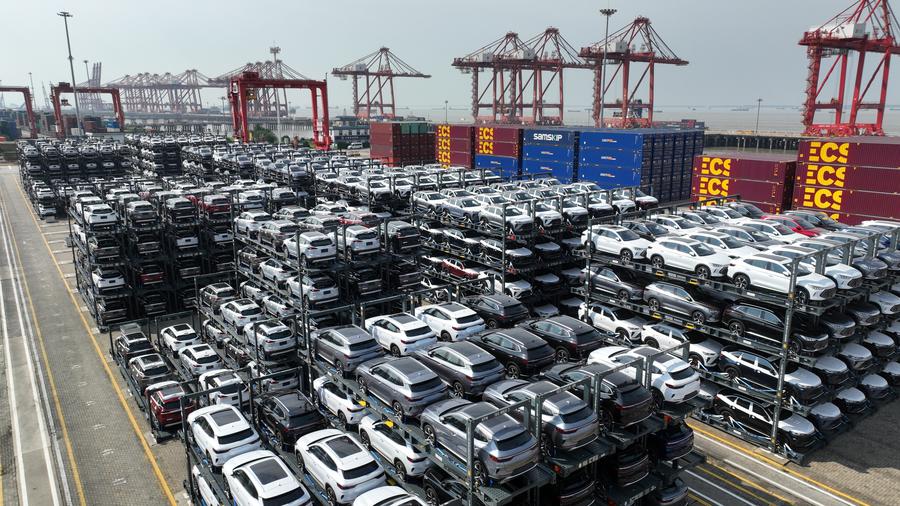
This aerial photo taken on July 11, 2023 shows new energy vehicles for export at a terminal of Taicang Port, east China's Jiangsu Province. (Photo by Ji Haixin/Xinhua)
Seeing is believing. The best way to understand the Chinese economy is to visit China for a firsthand experience.
BEIJING, Feb. 6 (Xinhua) -- Despite the pessimism among some Western economists regarding the Chinese economy, entrepreneurs like Jon Moeller, CEO of consumer products company P&G, are optimistic about future business opportunities in China.
The reason for this disparity is straightforward: While many Western economists rely on Excel spreadsheets and rigid models for their flawed projections, entrepreneurs with firsthand experience in the Chinese market tell a different story.
Moeller said a visit to China last month had bolstered his view that there would be opportunities to expand the company's business in the years ahead.
During a recent earnings call, Moeller said he spent six days in China, meeting the company's local employees and government officials and visiting residents' homes. "The long-term China opportunity remains intact," he said after his visit.
Seeing is believing. The best way to understand the Chinese economy is to visit China for a firsthand experience. This is crucial to businesses and investors: Knowing China well benefits investments.
Bridgewater Associates, the world's largest hedge fund, provides a good example. Despite widespread negative sentiment towards China's financial market, the hedge fund performed exceptionally well in China last year.
The performance of Bridgewater China Investment Management surpassed many local and other foreign funds and is set to grow to some 5.6 billion U.S. dollars at the end of 2023, according to the Financial Times.
Analysts attributed the hedge fund's outstanding performance to its investment strategy and the full experience gained from long-term research into the Chinese market.
Some Western economists who are indulged with rigid models may never accurately understand China's economy.
Not only have these economists failed in their predictions about China, but their estimates of the global economy have also been proven incorrect.
"Many economists are actually a tribal clique," said Christine Lagarde, European Central Bank president, who joined the chorus of criticism at the World Economic Forum in Davos, Switzerland, last month.
"They quote each other... They don't go beyond that world because they feel comfortable in that world," Lagarde said.
In 2023, China maintained the top position for growth among major economies, with a GDP expansion of 5.2 percent. Innovation-driven development, vibrant services spending and vigorous investments provided robust momentum for the country's economic growth.
As 2024 begins, booming consumption and vibrant tourism markets are a reality in China. Harbin, capital of China's northernmost province of Heilongjiang, attracted some 3.05 million tourists during the three-day New Year holiday thanks to its snowy landscapes and warm hospitality.
The country is also increasingly becoming a magnet for foreign visitors.
"When in Shanghai, I saw the most magnificent displays for Year of the Dragon," Maye Musk, mother of Tesla CEO Elon Musk, said on a social media post Saturday.
"More people should visit China," her son followed the next day on X, formerly Twitter.
As a thousand-year-old Chinese poem puts it, "If the waters of the spring river are warm, the frolicking ducks will be the first to know." To better know China, come see it for yourself.

